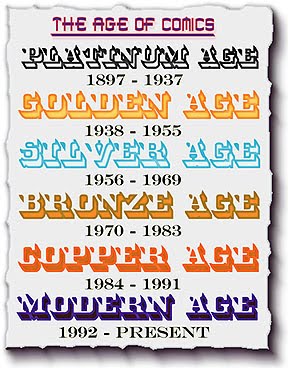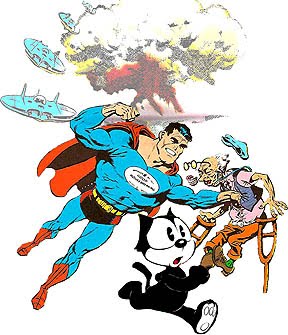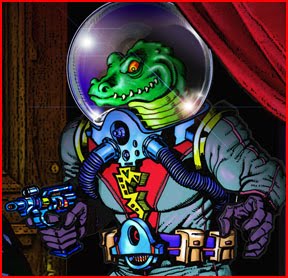The MOON-MAN made his one and only Golden Age appearance in pre-Marvel Timely Comics' MYSTIC COMICS #5, in early 1941. Sporting a glowing full moon emblem on his chest, the Moon-Man's powers (if any) seem a little vague, aside from breaking and entering (mostly through windows) and tussling with hoodlums. If nothing else, Moon-Man has an elevated sense of justice, and takes it upon himself to right the wrongs he perceives.
Moon-Man was drawn (and apparently created) by Golden Age great Fred Guardineer, who entered the field of comics in 1937, and two years later contributed to the now famous ACTION COMICS #1 (Superman's debut, of course) with his more well-known creation, ZATARA, the magician. Guardineers's work appeared in comics published by Quality, Magazine Enterprises, and DC/National until 1955, when he retired from comics. This story of the Moon-Man was his only effort for Marvel.
We can't be certain why Moon-Man never became a regular feature, as it was written and drawn as well or better than most comic stories of the era, and it holds a certain amount of charm even now. See if you find it as odd and humorous as I do!
_______________________
_______________________
_________________
MYSTIC COMICS #5, 1941 - cover art by Alex Schomburg
__________________________
THE APOCOLYTE'S COMIC COMMENTARY:
I can't help but comment on a few areas of this story that stand out in my opinion.
Where should we start?...ahem...
Sooooo...Moon-Man apparently has no secret identity, huh? This independently wealthy master of many sciences hangs around his luxury penthouse garbed in full superhero regalia, mask, cape and all! Careful, Moon-Man, sitting on your cape wrong could wrinkle it! I bet it gets in the way during those daily bathroom breaks, too!
Sooo...okay, Moon-Man finds an outrageous crime to avenge, the food-poisoning of orphans! He leaps into action - good thing he was already dressed for crime-fighting. Bursting into the window of Nadia, he shocks her into fainting. Being a red-blooded male, when confronted by a shapely, attractive female lying unconscious before him, Moon-Man does what comes naturally...he grabs her purse! In his defense, it DOES go with his outfit more than hers!
Having snatched Nadia's purse, Moon-Man races back to his hide-out. In this panel, we gain a clue to his background...to be precise: The way Moon-Man became independently wealthy?
He invented the automatic garage door opener...
Moon-Man can't just take the word of the news report about tainted meat...noooo, he has to go smell it for himself! Pheew! Yep, that's some stanky meat, boy!
Now we get to the heart of the crime of the century...This criminal mastermind McGool took the slowest way to become rich ever devised, by purchasing cheaper meat for the orphans, and pocketing the savings! Now, that's not even a crime, that's just wise investing and smart business, aside from the resulting botulism. Now, keep in mind that prices for things in 1941 were considerably less than today, for example: bread was 8 cents a loaf, milk was 34 cents a gallon, gasoline was 19 cents a gallon, and a new house was about $6,900. So, for McGool to buy 100 pounds of cheap meat and pocket the profit would have made this evil genius about $27.83! That's pure profit, kids! Getting rich the hard way!
Did you catch this one? This is one of two comic panels that shows Moon-Man's licence plate...Yep, that's the same glowing moon logo that's on his chest! Is that even legal? Try asking the DMV for that nowadays!
Now we witness Moon-Man's incredibly astute and ingenious detective work
Lucky for him McGool is even duller than he is, and leaves the one clue to his whereabouts laying on the floor. I guess there wasn't time to get a neon sign with an arrow...
Wait a minute...I'm not a lawyer, but it's clear that for all the "many sciences" Moon-Man is "master of", the law isn't one of them.
Phew, indeed! Moon-Man manages to leap of off the speeding train onto the jagged boulders hundreds of feet below while carrying the unconcious McGool. Moon-Man lands without a scratch, "No bones broken", but sadly, McGool's lifeless form, suffering massive internal bleeding and virtually every bone pulverized into dust, rests awkwardly upon the rocks.
McGool's corpse is charged with accidental food poisoning. Moon-Man, on the other hand, is charged with speeding, breaking and entering, assault, purse-snatching, indecent exposure (those legs - yeesh!), riding a train without a ticket, coercing a confession, 1st degree murder, and overdue library books.
Ah, the happy ending! Now those orphans will eat good, right Moon-Man?
Nope, with McGool in jail, the orphanage goes bankrupt and closes, forcing all the orphans out onto the street, where they all starve to death. THE END!
_________________________________













































A day before this post, Pappy offered a 1948 story about buried loot from a 1927 bank robbery. The writer solved a problem of the change in bills between those two years by having the robbers instead steal silver coin. But, as it happens, we're talking about the amount of silver coin that could be carried by one mortally wounded man. It's just not enough money to motivate other parts of the story (though, accounting for price inflation, it would be a very nice sum of money to have).
ReplyDeleteIn the early golden age, there seems to have been rather a lot of stories of costumed heroes bring to justice providers of state services who had been skimming state funds and delivering substandard product. Such stories may express a tension between populist tendencies of a distrust in people with power and of a longing for a welfare state; and these stories provide an explanation (sabotage) for the failures of the latter. My perception is that there were proportionately fewer such stories during the war, probably because it were considered harmful to the war effort to call state officials and their contractors into question — though in fact the war provided a lot of opportunity for such behavior, and that much of that opportunity was certainly seized.
A thoroughly engaging analysis, Daniel. One could conjecture that in 1941, prior to U.S. involvement in the Great War, the effects of the Great Depression were still being felt, therefore relatively small sums of currency could hold much more prodigious significance...i.e., to them with very little, a very little could be perceived as very much. McGool's imagined $27.83 could in actuality purchase 146.47 gallons of gasoline in 1941, certainly a precious and desired commodity in our present era. The average price for gas today in my state is about $3.75, so the cost to purchase the same quantity would run approximately $549.26. Why, in dire straits, for such a sum one might easily conceive a dastardly plot involving bestowing a banquet of bacterially besmirched beef upon a blameless bunch of wandering waifs!
Delete